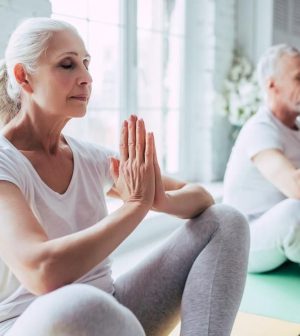- Could Artificial Sweeteners Be Aging the Brain Faster?
- Techniques for Soothing Your Nervous System
- Does the Water in Your House Smell Funny? Here’s Why
- Can a Daily Dose of Apple Cider Vinegar Actually Aid Weight Loss?
- 6 Health Beverages That Can Actually Spike Your Blood Sugar
- Treatment Options for Social Anxiety Disorder
- Understanding the Connection Between Anxiety and Depression
- How Daily Prunes Can Influence Cholesterol and Inflammation
- When to Take B12 for Better Absorption and Energy
- Epsom Salts: Health Benefits and Uses
Alternative Medicine Popular Among Seniors, But Most Don’t Tell Their Doctors About It

Lots of older folks are turning to alternative medicine to help them with the pains of aging – but they don’t necessarily think that’s any of their doctor’s business.
About 40% of older adults use at least one alternative medicine practice to help with body aches or mental strains, be it chiropractic care, massage therapy, meditation, yoga or another non-conventional option, according to the University of Michigan National Poll on Healthy Aging.
But only 18% of those who’ve tried an alternative medicine practice have actually talked about it with their health care provider.
The results suggest that primary care docs should bring up the topic during checkups, said Dr. Rachael Maciasz, a general internal medicine physician at Michigan Medicine who worked with the polling team on the report.
“As research continues to show the importance of the mind-body connection in health, and as more rigorous studies are done to determine what effects integrative strategies can have on various conditions, it’s important for patients and providers to keep the lines of communication open,” Maciasz said in a news release on the report.
Just about everyone surveyed said they believe that the mind impacts health, with 82% saying it has a major impact and 14% saying it has a minor impact.
The people surveyed said they had tried alternative medicine to treat or prevent pain, insomnia, digestive issues, to relax or manage stress, to address a physical injury, or to help with depression or anxiety.
About 38% of people 50 and older found alternative medicine very beneficial, while another 54% said it was somewhat beneficial.
Those who pursue such practices tend to pay for it out of pocket, the findings showed.
Only 15% said their health insurance covers them, 19% said they have no coverage, and two-thirds were unsure about their coverage.
About 84% said they’d be likely to try alternative medicine if health insurance covered it. Of those who’ve stopped using such a practice, more than one-quarter cited cost as one of the reasons.
More information
The U.S. National Center for Complementary and Integrative Health has more about integrative health.
SOURCE: University of Michigan, news release, July 22, 2022
Source: HealthDay
Copyright © 2026 HealthDay. All rights reserved.










